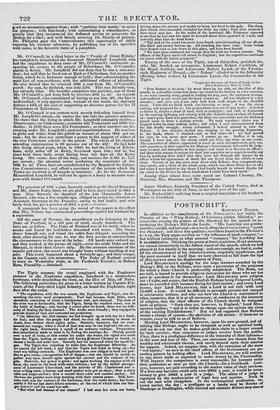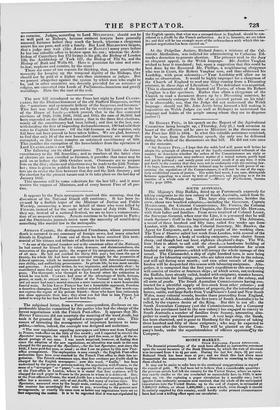POSTSCRIPT.
SATURDAY NIGHT.
In addition to the compliments of Dr. PIDLLPOTTS last night, the Premier of the " Whig-Radical, O'CoNNELL-ridden Ministry," re- ceives this evening the praises of the Standard, for his speech on in- troducing the Bishop's Bill to the Lords. " His Lordship was gentle- manlike, candid, and rational—in a word, altogether Conservative," quoth the Standard ; and these fine qualities, so seldom found in the Premier's o .1017, the Tory organ ascribes to "the influence of good company,"— but without informing us what unusual " company " his Lordship has b en admitted to. Thinking the praise at least suspicious, if not ominous, we turned instinctively to the fullest report of the speech, which we had glanced at but hastily in the morning : and sure enough, we find it, under all the circumstances of his Administration, singularly injudicious, and the most unsound in itself that we have observed to fall from the lips of MELBOURNE since his displacement of PEEL. Lord MELBOURNE'S apology for the large incomes awarded by the Bishop's Bill to the Bishops, rests upon a perversion of the purposes for which a State Church is professedly established. The State, we are told, is bound to provide religious instruction for those who are too poor to purchase it for themselves : Lord MELBOURNE puts religion out t f sight, and argues, that the English Bishops being Temporal Lords, must be provided with incomes fitting for their station ; and every Lord knows, says Lord MELBOURNE, that a Lord is not rich with only 15,0001. a year. It would be difficult to persuade persons not steeped in aristocratic notions, and who see how the Church is maintained in other countries, that it is at all necessary, or conducive to the interests of religion, that the chief officers of the Church should be temporal lords or princes. " Such they are, however, in England," Lord MEL- BOURNE replies; " and it is unfair to charge upon our system the vices of the existing Establishment." But we had supposed that Reform meant a change of system—the abolition of old abuses : if these are to remain, cease to talk to us of Reform. Meeting Lord MELBOURNE, however, upon his own ground, and ad mitting that Bishops ought to be temporal as well as spiritual lords, still we do not see that he makes good their claim to a larger reward for their services, than statesmen or judges receive from the public. First, there is a prodigious difference in the intensity of their labours— in the wear and tear of life. Then, our statesmen are chosen from the wealthy and aristocratic classes, and rarely depend upon their salaries for support. Indeed, we suppose that, with the exception of the mere " red-tapists," no men in the chief offices of the Government are pe- cuniary gainers by holding office. Lord MELBOURNE, we will venture to say, never made or expected to make money by the Premiership. With lawyers the comparison is more reasonable, for lawyers enter their profession as men go into the Church—for a livelihood. Law- yers, however, are paid according to the market value of their services. If a first-rate barrister could only earn 2000/. a year, it would be unne- cessary to give 5000/. a year to a judge. The salary of a judge is regulated by the market-price of legal lore and success. Such is not the case with clergymen. In the ecclesiastical profession, in- terest carries the day : a profligate or a booby may be Rector of Stanhope or Doddington, while learned and eminent divines may starve.
On miracles. Judges, according to Lord MELBOURNE, should not be so well paid as Bishops, because eminent lawyers have generally amassed fortunes before they reach the bench, whereas a clergyman enters his see poor, and with a family. But Lord MELBOURNE forgets, that a judge may wait (like ABBOTT or BAYLEY) many years before be has one valuable office to bestow upon his son ; whereas the Arch- bishop of Canterbury has 172 livings in his gift, the Bishop of London 126, the Archbishop of York 127, the Bishop of Ely 95, and the Bishop of Bath and Wells 80. Here is provision for sons and sons- in-law, nephews and cousins, by the score ! These are some of our reasons for thinking, that, even granting the necessity for keeping up the temporal dignity of the Bishops, they should not be paid at a higher rate than statesmen or judges. But we protest altogether against the system by which men who ought to be, and in other countries are, decently provided for as ministers of religion, are converted into Lords of Parliament—luxurious and greedy worldlings. Here lies the root of the evil.



























 Previous page
Previous page